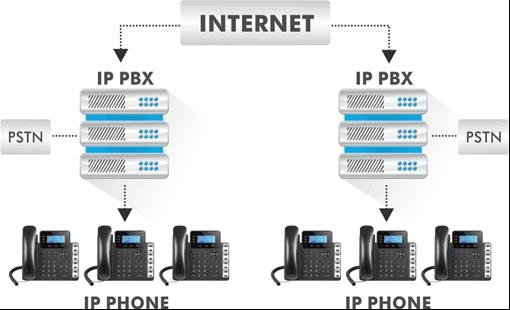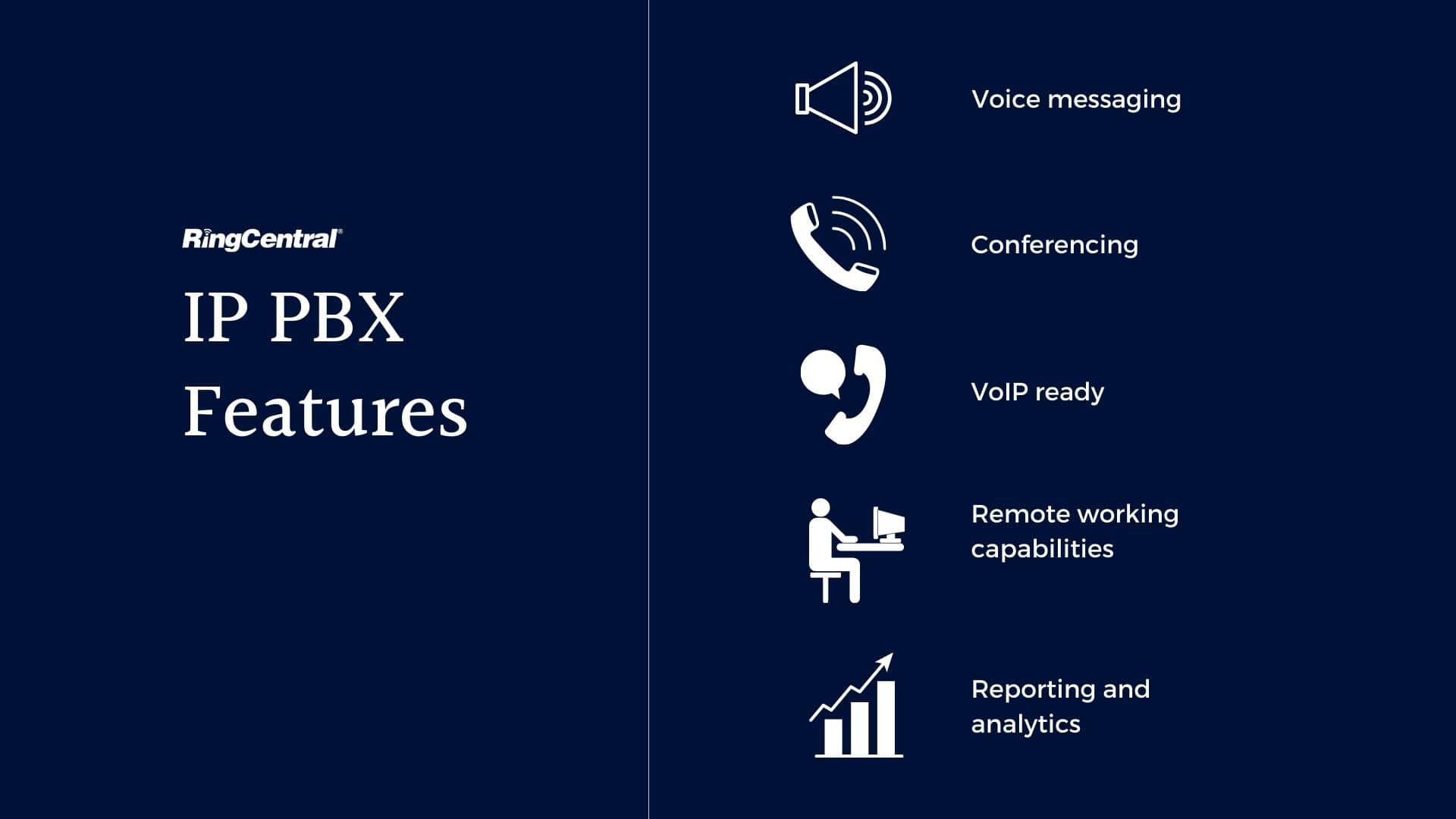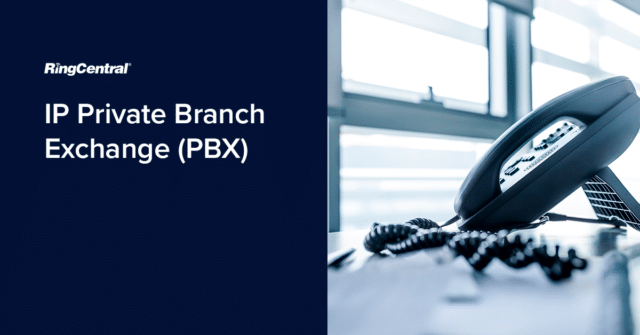There are several varying names for an IP PBX solution, including VoIP PBX, Cloud PBX, or a VoIP server. In essence, it’s all the same thing; a business phone system that uses a centralised switch system to connect calls to and from the outside world. Replacing numerous individual phone lines, the PBX.
What is an IP PBX?
Breaking the definition down a little further, IP (or internet protocol) deals with data transmission between servers. With IP telephony, calls are established via an internet connection. A PBX (private branch exchange) is essentially your internal business telephone network and acts as a sort of gateway for incoming and outgoing business phone calls. A PBX can be either based on-premises or can be hosted by a VoIP provider.
The main role of the IP PBX is to handle the call traffic to and from business premises, as well as internal calls throughout the business’s telephone network. An IP PBX system is a system that allows users to share several phone lines and switches call between VoIP (voice over internet protocol) users. An IP PBX system can also switch calls between traditional telephone users and VoIP users in the same way as its legacy counterpart.
Unlike a traditional PBX, which required separate networks for voice and data, one of the key advantages of an IP-based telephone system is that it works using converged voice and data networks. That means businesses using an IP solution have internet access, voice calls and other VoIP communication channels all via a single system, allowing better agility, flexibility and better opportunities to scale.

How does an IP PBX work?
An IP phone system receives and transmits your outgoing and incoming calls over the internet. As with VoIP technology, an IP system does this by converting analogue voice signals into digital data, directing these data packets to a VoIP service provider to initiate and terminate each call.
An IP PBX generally uses the universal protocol, SIP (session initiation protocol), commonly used in most business VoIP systems. When a PBX is used, this requires SIP trunking, a solution that allows multiple separate lines or voice channels to be used. SIP trunks are used to connect desk phones or other hardware to the network. This allows businesses to set call groups, routing and check voicemails all via their IP-based PBX.
IP PBX users will require a VoIP provider to allocate credentials to the SIP trunking accounts so that calls can be appropriately directed and received by your business PBX.
Your IP PBX also manages both internal and external calls, determining whether calls need to be transferred via the PSTN (public switched telephone network)
Key IP PBX features
Switching from a legacy system to an IP-based PBX means that business users benefit from several more advanced features.

If you’re on the lookout for a new IP PBX, be sure to look out for the following key features:
1. Voice messaging
Once a ‘nice to have’ or an optional add-on, voicemail features come as standard with your IP phone system. If you have a dynamic workforce, it might also be worth shopping around for a system that enables voicemail messages to be sent as an attachment to the recipient’s email, either as transcription or an MP3 file. Likewise, it might be worth investing in a solution that supports visual voicemail.
2. Conferencing
Multi-party conferencing has become our bread and butter in recent months, so it’s important to look for a solution that comes with in-built support not just for simple three-way calling but multiple-participant conferencing.
3. VoIP ready
With telecommunications technology evolving at an unprecedented rate, it’s natural that businesses move away from using traditional PBX systems and traditional PSTN lines. Studies have shown that 40% of businesses prefer VoIP in the UK alone. Ensuring that your PBX supports IP stations and IP trunks is key as you grow your business into the digital age.
4. Remote working capabilities
With remote and home working set to endure, it’s worth investing in a business phone system that supports this mobility and agility. It’s important to ensure your IP PBX system comes with features such as ‘Find Me, ‘Follow Me’, fixed/mobile convergence and remote IP extensions to ensure your workforce can be efficient and contactable as they work remotely or on the move.
5. Reporting and analytics
Most IP PBX systems now come with basic reporting features built-in, and some might offer more advanced reporting and analytics. Be sure to address your business requirements when it comes to reporting, and at the very least, look for a system that comes with simple call history reporting enabled.
RELATED READING: The Best Unified Communications Features to Look for
Types of IP PBX
Choosing the right PBX solution for you is the first port of call when you decide to switch from a legacy system. But with some different options available, making the right choice can be challenging. In a nutshell, here is a breakdown of the two most common types of PBX suitable for your modern business needs.
-
On-premises IP PBX
Also commonly known as a VoIP PBX, your on-premises IP PBX will utilise existing internet connections and internal networks and reside within your office building. A VoIP PBX allows for more advanced features than a legacy PBX. Some offer more advanced call routing, fixed/mobile convergence, interactive voice response, voicemail to email, conferencing, and video calling. An on-site IP system often works best when combined with SIP trunks to deliver better resilience and deliver more stable sound quality over legacy systems. This combination also allows for better business continuity with assets such as disaster recovery.
-
Cloud PBX
A cloud PBX, also known as a hosted PBX or virtual PBX, is a digital system hosted in the cloud and owned and managed by a dedicated provider. Operated entirely over the internet, this software-based solution is maintained in the cloud to allow users to benefit from the intuitive functionality of a PBX system, but with more scalability for the business and more agility and flexibility for their employees.
With a cloud system, businesses have the ability to choose the platform and telecom service provider, meaning you can choose a supplier that you trust to uphold the best levels of security and resilience for your business phone system. As well as extensive PBX functionality including voicemail, virtual fax machines, audio conferencing, call recording and the ability to manage easily and add new phone numbers via an online portal, users can even integrate their phone system to their business CRM and other platforms, allowing you to make your business processes more efficient.
One key benefit of investing in a cloud-based system is that the cost is payable to your telephone company in manageable, regular payments without the huge initial outlay on hardware. With a cloud PBX, your business phone features, including phone, fax, messaging, and conferencing, are billed all together, usually as a monthly, manageable cost. Adopting a cloud system also means you’ll benefit from regular maintenance and PBX software updates as a part of that cost.
As many forward-thinking businesses seek to adopt a more software-based solution with unified communications platforms becoming more and more favourable for those looking to streamline their business processes, cloud PBX systems are rapidly becoming the solution of choice.
Reasons to Switch to an IP PBX
Whether you’re looking to lower your telephony and communications costs, offer better reliability, scale up or go global, switching to an IP PBX is a wise choice. Adopting an IP-based communications system can come with some perks, so here are a few reasons you might want to consider switching.
- You’re looking for a more manageable, easy-to-use system.
Regardless of whether you opt for a cloud solution or an on-site PBX, an IP PBX will be managed via a web-based dashboard. That means skilled or unskilled technicians should be able to easily maintain, customise and fine-tune your phone system according to your needs. Managing your own PBX easily means you can save your IT teams’ time and money on outsourcing dedicated technicians.
- It would be best if you had a solution that’s quick and easy to install
As it runs as software, an IP system means you can install and configure the solution much more quickly than when there is excessive hardware involved. Any technician with a little knowledge of networking and IT can install and maintain an IP PBX system, saving you money and minimising the costly downtime of installing a new system.
- You want to save money on communications.
If your business regularly makes overseas calls or finds your telephony costs rack up, a hosted PBX might save you a significant amount on your monthly bills. With an IP system using a VoIP provider for long-distance or international calls, your monthly fees could be significantly reduced. Likewise, if you have a multi-site office structure, you can easily connect the systems allowing you to make phone calls free of charge.
- You want to reduce phone wiring around the office.
Adopting a VoIP phone system means you can connect your phones directly into a standard computer network port, or, in the case of softphones instead of analogue phones, these can be installed onto the users PC. This makes adding or changing numbers and extensions for each endpoint much easier. In the case of an office relocation, you can eliminate the excessive need for unsightly phone wiring.
- You want to lay the foundations to scale
If you have outgrown your legacy, on-premises system, and you have plans to grow your business, it’s worth considering a switch to an IP phone solution. Whether you’re a small business looking to expand, or an international enterprise, investing in an IP system means you can stay dynamic and add more phone lines and extensions whenever you need to.
- You want to improve the customer journey.
You may not think of your phone system as a tool to support a much-improved customer journey. Still, an IP PBX, particularly a hosted solution, could help you deliver a more friction-free experience for your customers. A cloud-based solution enables you to integrate your key communications functions with your everyday business applications, including calendars, Google Suite and Microsoft 365 tools and CRM tools such as Salesforce. This means your call centre agents and general staff can be more efficient, more productive, and you can deliver a more seamless customer experience.
- You want to consolidate your communications channels.
If you use disparate tools and applications for instant messaging, file storage, fax, phone and video conferencing, it might be worth consolidating your tools. Unified communications are seeing a huge uptake as businesses look to reduce their patchwork of different applications, streamline processes and save money by using one provider for all their communications needs.
- You want to allow better mobility.
Remote working has truly taken hold in recent months, and the home working set to continue, offering flexibility and agility for your staff is crucial. With an IP phone solution, mobility becomes much easier. With many providers offering softphones and applications for cell phone devices, a hosted IP telephony solution means your team members can connect with colleagues and customers from anywhere.
Switch to RingCentral Hosted PBX
Making the switch from an on-site PBX to a hosted PBX solution allows better mobility, flexibility and access to a whole host of advanced phone features that improve your business efficiency.
RingCentral’s cloud phone system serves your entire workforce through a single, centralised, cloud-based platform, delivering all your communications needs reliably via the internet. That means every member of your team has access to the same advanced, robust features and functions, whether they’re in an office, at home, or on the move.
Bringing messaging, video and phone altogether in one single platform that’s accessible across all your favourite devices, users can benefit from advanced features such as call monitoring and reporting, call recording, call flip, screen sharing, file sharing and more.
RingCentral’s hosted PBX solution delivers a phone system that grows in tandem with your business. Easy to use, via an online administration dashboard, the system is quick and easy to deploy, customisable. With regular updates and 24/7 support, our 99.999% uptime SLA means you won’t ever miss a call.
Originally published May 04, 2021, updated May 20, 2021

